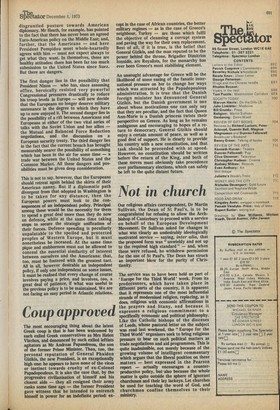Coup approved
The most encouraging thing about the latest Greek coup is that is has been welcomed by such exiled Greek conservatives as Mrs Helen Vlachos, and denounced by such exiled leftists agitators as Mr Andreas Papandreou, the son of the former Prime Minister. Then, too, the personal reputation of General Phaidon Gizikis, the new President, is an exceptionally high one: he appears to have none of the vices or instinct towards cruelty of ex-Colonel Papadopoulous. It is also the case that, by the progressive civilianisation of himself and his closest aids — they all resigned their army ranks some time ago — the former President gave witness that he intended to entrench himself in power for an indefinite period: ex cept in the case of African countries, the better military regimes — as in the case of Greece's neighbour, Turkey — are those which fulfil the objective of cleansing a corrupt system and paving the way for their own replacement. Best of all, if it is true, is the belief that General Gizikis, and the man reputed to be the power behind the throne, Brigadier Dimitrios lonnidis, are Royalists, for the monarchy has ever been Greece's most stabilising element.
An unsought advantage for Greece will be the likelihood of some easing of the fanatic international pressure on her to change her ways which was attracted by the Papadopoulous administration. It is true that the Danish foreign minister has denounced General Gizikis, but the Danish government is one about whose motivations one can only say that they are peculiar, and the fact that Queen Ann-Marie is a Danish princess twists their perspective on Greece. As long as he remains ambiguous and encouraging to hopes of a return to democracy, General Gizikis should enjoy a certain amount of peace, as well as a good deal of support. He is clearly to provide his country with a new constitution, and that task should be proceeded with at speed. However, no constitution should be written before the return of the King, and both of these moves must obviously take precedence over parliamentary elections, which can safely be left to the quite distant future.










































 Previous page
Previous page